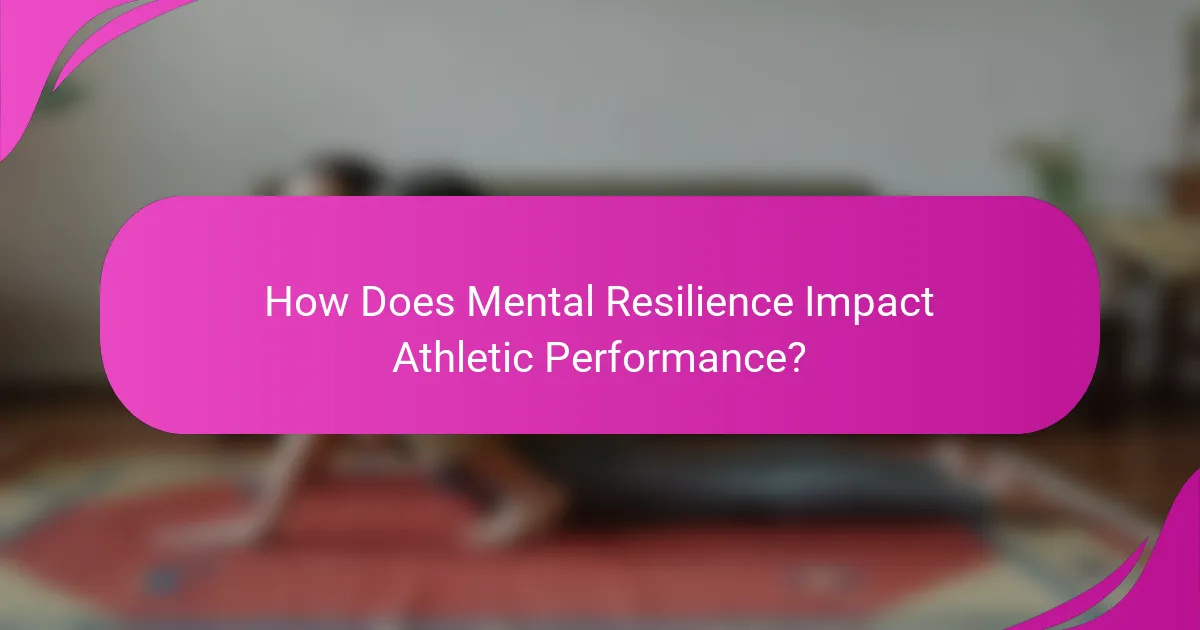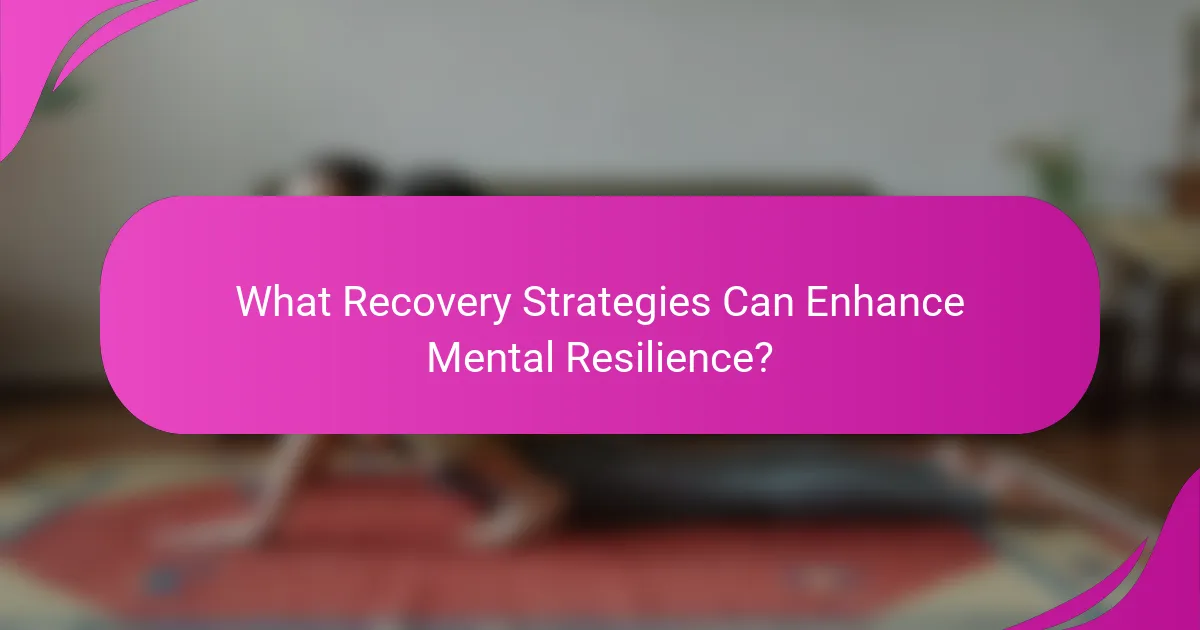Mental resilience is crucial for athletes, impacting performance and recovery. This article explores how mental resilience enhances focus, decision-making, and adaptability. It discusses effective recovery strategies like mindfulness, structured rest, and social support systems. Unique techniques such as visualization and cognitive restructuring further strengthen mental resilience, enabling athletes to manage stress and recover effectively.

How Does Mental Resilience Impact Athletic Performance?
Mental resilience significantly enhances athletic performance by improving focus, reducing stress, and enabling quicker recovery. Athletes with strong mental resilience can maintain composure under pressure, leading to better decision-making during competitions. Research shows that mental resilience correlates with higher achievement levels, as resilient athletes often exhibit greater perseverance and adaptability. Developing recovery strategies, such as mindfulness and positive self-talk, further supports this resilience, allowing athletes to bounce back from setbacks more effectively.
What are the Key Components of Mental Resilience for Athletes?
Mental resilience for athletes includes adaptability, emotional regulation, focus, and support systems. These components enable athletes to recover from setbacks and maintain performance under pressure. Adaptability allows athletes to adjust strategies during competition. Emotional regulation helps manage stress and anxiety. Focus enhances concentration on goals. Support systems provide encouragement and guidance. Together, these elements foster a strong mental framework essential for athletic success.
How Do Emotions Influence Athletic Performance?
Emotions significantly influence athletic performance by affecting mental resilience and recovery strategies. Athletes who harness positive emotions can enhance focus and motivation, leading to improved outcomes. Conversely, negative emotions may hinder performance and recovery. Research indicates that emotional regulation techniques, such as mindfulness and visualization, can foster resilience and optimize athletic performance. Athletes who feel supported and motivated are more likely to experience better recovery and sustained performance levels.
What Role Does Self-Confidence Play in Mental Resilience?
Self-confidence significantly enhances mental resilience by fostering a positive mindset and promoting adaptive coping strategies. Athletes with high self-confidence are more likely to face challenges head-on and recover from setbacks effectively. Research indicates that self-confidence correlates with improved performance and psychological well-being, creating a robust foundation for resilience. By believing in their abilities, athletes can navigate stress and adversity, leading to greater success in their recovery strategies.
What Are Common Sources of Mental Fatigue in Athletes?
Mental fatigue in athletes often stems from psychological stress, overtraining, and lack of recovery. Key sources include intense competition pressure, high training volumes, and inadequate mental rest. As a result, athletes may experience decreased performance, motivation, and overall well-being. Addressing these factors is crucial for mental resilience and effective recovery strategies.
How Does Training Intensity Affect Mental Fatigue?
Higher training intensity can increase mental fatigue, impacting athletes’ performance and recovery. Intense training depletes mental resources, leading to feelings of exhaustion and decreased motivation. Athletes may experience diminished cognitive function, affecting decision-making and reaction times. Recovery strategies, such as adequate rest, nutrition, and mental conditioning, can mitigate these effects, enhancing overall resilience. Balancing intensity with recovery is crucial for maintaining mental strength.
What Psychological Factors Contribute to Mental Exhaustion?
Psychological factors contributing to mental exhaustion include stress, burnout, and emotional fatigue. Athletes often face intense pressure, leading to decreased motivation and performance. Stressors such as competition, training demands, and personal expectations can exacerbate mental fatigue. Burnout manifests through chronic stress, resulting in diminished interest and energy. Emotional fatigue arises from prolonged emotional investment, impacting mental resilience. Recognizing these factors is crucial for developing effective recovery strategies.

What Recovery Strategies Can Enhance Mental Resilience?
To enhance mental resilience, athletes should adopt recovery strategies that promote emotional and psychological well-being. Key strategies include mindfulness practices, structured rest periods, and social support systems. Mindfulness can reduce stress and improve focus. Structured rest helps prevent burnout and fosters recovery. Social support provides encouragement and accountability, strengthening mental resilience.
How Can Mindfulness Practices Aid in Recovery?
Mindfulness practices significantly aid recovery by enhancing mental resilience in athletes. These techniques promote emotional regulation, reduce stress, and improve focus. Studies show that athletes who engage in mindfulness experience quicker recovery times and better performance under pressure. By fostering self-awareness, mindfulness helps athletes recognize and manage their thoughts, leading to improved mental health and overall well-being.
What Techniques Are Effective for Mental Recovery?
Effective techniques for mental recovery include mindfulness, visualization, and structured routines. Mindfulness practices help athletes focus on the present, reducing anxiety and enhancing performance. Visualization techniques allow athletes to mentally rehearse their skills, improving confidence and execution. Structured routines provide a sense of control and predictability, essential for mental resilience. Incorporating these strategies fosters a supportive environment for athletes to recover and thrive.
How Does Social Support Influence Recovery?
Social support significantly enhances recovery by providing emotional, informational, and practical assistance. Studies show that athletes with strong social networks experience lower stress levels and faster rehabilitation. This support fosters resilience, enabling athletes to overcome setbacks and maintain motivation. As a result, the presence of supportive relationships is a unique attribute that can transform recovery outcomes.
What Are the Benefits of Team Dynamics in Recovery?
Team dynamics significantly enhance recovery by fostering support, accountability, and motivation among athletes. Effective collaboration leads to improved mental resilience, as shared experiences facilitate coping strategies. Research indicates that athletes in cohesive teams exhibit lower stress levels and better performance metrics. Additionally, the unique attribute of trust within a team can accelerate recovery processes, allowing individuals to feel safe discussing challenges. As a result, strong team dynamics not only promote emotional well-being but also enhance overall athletic performance.
How Can Coaches Foster a Supportive Environment?
Coaches can foster a supportive environment by prioritising open communication and trust. Establishing a culture of feedback encourages athletes to express concerns and share experiences. This approach enhances mental resilience, allowing athletes to feel valued and understood. Additionally, incorporating team-building activities strengthens relationships, promoting a sense of belonging. Regularly acknowledging individual and team achievements further reinforces a positive atmosphere, motivating athletes to strive for their best.

What Unique Approaches Exist for Mental Recovery?
Unique approaches for mental recovery include mindfulness techniques, cognitive behavioural strategies, and social support systems. Mindfulness enhances self-awareness, reducing anxiety and improving focus. Cognitive behavioural strategies help athletes reframe negative thoughts, fostering resilience. Social support systems provide emotional backing, crucial for recovery. Each approach uniquely contributes to an athlete’s mental resilience, enabling better performance under pressure.
How Does Visualization Contribute to Mental Recovery?
Visualization significantly enhances mental recovery by improving focus, reducing anxiety, and fostering a positive mindset. Athletes who practice visualization techniques often experience quicker recovery times and improved performance. Research indicates that mental imagery activates similar brain regions as physical practice, reinforcing neural pathways essential for recovery. Additionally, visualization can serve as a unique attribute in resilience training, allowing athletes to mentally rehearse successful outcomes and build confidence. This mental rehearsal not only aids in physical recovery but also strengthens mental resilience, crucial for overcoming challenges.
What Role Does Nutrition Play in Mental Resilience?
Nutrition significantly enhances mental resilience by providing essential nutrients that support brain function and emotional stability. A balanced diet rich in omega-3 fatty acids, antioxidants, and vitamins can improve mood and cognitive performance. For athletes, proper nutrition facilitates recovery, reduces stress, and enhances overall mental health, which is crucial for resilience during competitive challenges. Consuming whole foods, such as fruits, vegetables, lean proteins, and whole grains, contributes to optimal mental performance and emotional well-being.
What Foods Enhance Cognitive Function and Recovery?
Foods that enhance cognitive function and recovery include fatty fish, blueberries, turmeric, broccoli, pumpkin seeds, and dark chocolate. These foods provide essential nutrients that support brain health and improve mental resilience.
Fatty fish, rich in omega-3 fatty acids, boost cognitive function and reduce inflammation. Blueberries contain antioxidants that enhance memory and learning. Turmeric, with curcumin, improves mood and promotes neurogenesis. Broccoli offers vitamin K, which is linked to better cognitive performance. Pumpkin seeds provide magnesium and zinc, crucial for brain health. Dark chocolate, high in flavonoids, enhances blood flow to the brain, improving memory and focus.
Incorporating these foods into an athlete’s diet can significantly aid in recovery and cognitive resilience.

What Rare Strategies Can Athletes Employ for Mental Resilience?
Athletes can employ rare strategies such as visualization, mindfulness, and cognitive restructuring to enhance mental resilience. These techniques foster a strong mental framework, allowing athletes to manage stress and recover effectively. Visualization helps athletes mentally rehearse performance scenarios, improving confidence. Mindfulness promotes present-moment awareness, reducing anxiety. Cognitive restructuring enables athletes to reframe negative thoughts, fostering a positive mindset. Together, these strategies create a unique approach to mental resilience, setting athletes apart in their recovery processes.
How Can Creative Outlets Facilitate Mental Recovery?
Creative outlets significantly enhance mental recovery by fostering emotional expression and reducing stress. Engaging in activities like art, music, or writing allows athletes to process their experiences, leading to improved mental resilience. Studies show that creative expression can lower anxiety levels and boost overall well-being. This unique attribute of creativity serves as a powerful tool for athletes facing mental challenges during recovery. As a result, incorporating creative outlets into recovery strategies can facilitate a more holistic approach to mental health.
What Innovative Technologies Are Available for Mental Training?
Innovative technologies for mental training enhance athletes’ resilience and recovery. These include virtual reality for immersive experiences, biofeedback devices that monitor physiological responses, and mobile apps offering guided meditation. Wearable tech provides real-time data on stress levels, while AI-driven platforms personalize training programs. Each technology supports mental strength, crucial for athletic performance.

What Are the Best Practices for Maintaining Mental Well-being?
To maintain mental well-being, athletes should prioritise mental resilience through structured recovery strategies. Key practices include developing a strong support system, engaging in mindfulness techniques, and setting realistic goals. Regular physical activity enhances mood and reduces stress, while adequate sleep is crucial for cognitive function. Additionally, seeking professional help when needed can provide tailored strategies for individual challenges.
What Common Mistakes Should Athletes Avoid in Recovery?
Athletes should avoid common mistakes such as neglecting hydration, skipping rest days, and ignoring nutrition. These errors can hinder recovery and performance. Proper hydration is essential for muscle repair, while rest days allow the body to heal. Balanced nutrition supports energy levels and recovery processes.
How Can Athletes Develop a Personalized Recovery Plan?
Athletes can develop a personalized recovery plan by assessing their unique needs and goals. This involves evaluating physical demands, injury history, and mental resilience. Incorporating techniques such as active recovery, nutrition, and mental strategies enhances overall effectiveness. Regularly adjusting the plan based on progress and feedback ensures optimal recovery tailored to each athlete.
What Expert Insights Can Guide Athletes in Mental Recovery?
Athletes can benefit from expert insights on mental recovery by fostering resilience through structured strategies. Techniques such as mindfulness, visualization, and cognitive restructuring enhance mental fortitude. Research indicates that athletes who engage in regular mental training show improved performance and recovery rates. Additionally, seeking support from sports psychologists can provide tailored strategies to navigate the psychological challenges of competition and recovery.